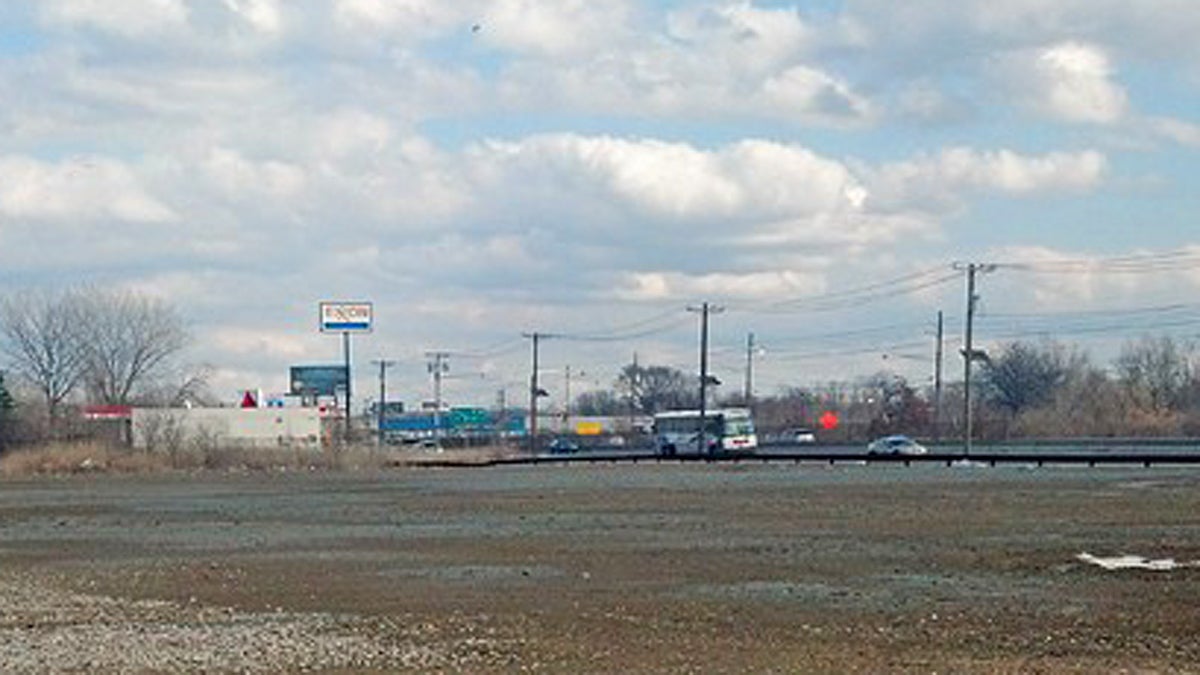Planned Shoprite unlikely to solve Camden’s ‘food desert’ problem

The empty field where a Shoprite will be built in Camden. (Tara Nurin/for NewsWorks)
When Camden Mayor Dana Redd announced the construction of the first new full-service supermarket to enter Camden in 30 years (a ShopRite), many hailed it as a lifeline for a city whose desperately poor population of 77,000 has long survived with just one national grocer (a Pathmark).
With its widespread and deep poverty, dearth of vehicle ownership and absence of a traditional supermarket within close proximity to most residents, the United States Department of Agriculture (USDA) has designated Camden as a food desert, one that many consider to be among the top ten worst in the country and one that will suffer even more painfully when the Pathmark closes for good next month.
Who benefits most?
But the placement of the new ShopRite along the Admiral Wilson Boulevard, which serves as the main connector between South Jersey and the Benjamin Franklin Bridge, has some speculating that the Shoprite that’s scheduled to open in 2015 isn’t being designed with Camden residents in mind. Instead they fear it aims to primarily serve commuters on their way home from Philadelphia, which for skeptics explains why its selected location might prove inconvenient to the people who need it most.
“Admiral Wilson Boulevard is not pedestrian friendly and it’s not bike friendly,” said Ari Rosenberg, an urban farmer and educator at the Center for Environmental Transformation, located in the southernmost Camden neighborhood of Waterfront South. “If I were going to take (public transportation) I’d have to take two buses. It would take half an hour and I’d have to walk five minutes from the closest bus to the store.”
“That ShopRite is going to be 2.1 miles from my house. I’d have to drive. And it’s got to be drivers – especially commuters – they’re targeting. Look at where it is,” said Carl Chandler, a car-owning homeowner in the middle-class Cooper-Grant neighborhood.
But Camden County Freeholder Director Lou Cappelli countered that, “There are plenty of supermarkets in the suburbs. And the ShopRite is on the wrong side of the street. You can’t access it (directly) unless you’re going into Camden or toward Philly. I see no logic behind that assertion.”
Getting to the Shoprite
Developers haven’t decided whether they’ll build additional entrances and exits to eliminate the need for jughandling and sudden exiting from the multi-lane, high-speed road. A spokesperson from the New Jersey Department of Transportation says that if the shopping center boosts the number of trips on existing ramps by more than 500 per day, the developer will be required to apply for access permits, at the very least.
Though partially cut off from residential areas by the highway, the Cooper River and some sprawling commercial and industrial sites — both abandoned and in use — geographically, the ShopRite site is very central relative to the city and is serviced by at least three bus routes.
Developer: It’s for everyone
Jeremy Fogel, executive vice president and development director of The Goldenberg Group that’s developing the ShopRite as part of a suburban-style shopping center, agrees that the store’s parent company approved this location after a ten-year search in part because of its ability to attract suburban shoppers in transit to and from Philadelphia.
But he grows testy when it’s suggested that the feeding of Camden residents may serve as a politically expedient cover for the construction of yet another chain store that will almost certainly benefit from public incentives reserved for projects in blighted cities.
“Who would possibly say that? Who would possibly say that?” he stammered, before insisting that the brothers who will operate the ShopRite have time and again proven their commitment to the six other South Jersey communities their stores serve.
“The Ravitz family is not in any way downsizing or shorting the items or services in Camden, and this store, I believe, will carry their most significant offerings. What they do extremely well is modify their product group to make sure they’re responding to what the community wants,” he said.
Indeed, the grocery store will accept food stamps and house full-service floral, seafood and meat departments, a bakery, and hundreds of types of fresh produce delivered daily. It will also staff a dietician to consult with shoppers, plus drivers to deliver orders.
Sheila Davis, president of the Lanning Square West Association, said she’s going to try to work with the store to arrange group deliveries or pick-ups for her elderly constituents. Plus, she said, “It is on bus route number 409. That’s less than a seven-minute ride.”
Fogel adds that his group, who was brought into the project by the Ravitzes, is cleaning up the vacant land that he said is contaminated and prone to flooding.
“We’re taking a site that’s completely non-performing and turning it into a property that has the potential to be transformative to the city,” he said.
Camden needs more than one
While that may be true, it’s slightly more difficult to argue that the ShopRite will help the city crawl out from under its food desert designation, as do all of the press releases touting its pending arrival. According to the USDA, the southern and western portions of the city qualify as a food desert but the northern and eastern portions – closest to where the ShopRite will be constructed – don’t.
It’s likely that the presence of a new branch of the local Fine Fare grocery chain nearby is helping to ease the pressure, though no data was available to determine whether the Fine Fare carries a full line of products and generates more than $2 million in revenues to meet the USDA’s definition of a supermarket.
Looking toward the future, developers of the forthcoming Haddon Avenue Transit Village are looking for a replacement for The Fresh Grocer, which had previously committed to establishing a presence in the city, though Whole Foods, which already supports some city programs, has recently sent in team members for an informational driving tour.
But on the whole, these nuances matter less to Cappelli than the solid evidence of forward movement brought about by the ShopRite. “We need more than one supermarket,” he said. “I’m hoping there will be more. The existence of just this one does not cure all of our woes in Camden City,” he said.
WHYY is your source for fact-based, in-depth journalism and information. As a nonprofit organization, we rely on financial support from readers like you. Please give today.




